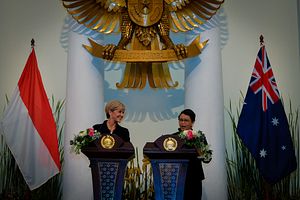Indonesia’s rocky defense relationship with Australia hit yet another snag this week. On January 4, Indonesia’s military spokesman Major-General Wuryanto confirmed to reporters that bilateral military cooperation had been suspended temporarily for technical reasons. While the extent of this fallout appears to be much more limited than initially suggested and both sides have signaled their commitment to preserve ties, it has nonetheless revealed the fragile nature of a deepening defense relationship between the two sides.
Indonesia and Australia have long had a turbulent relationship, and this is hardly the first time that military ties between the two countries have been suspended. Indeed, irritants have persisted even as the defense relationship has strengthened over the past decade, with the signing of the Lombok Treaty in 2006 and the inking of the Defense Cooperation Agreement and launching of the two-plus-two dialogue in 2012 (See: “Indonesia-Australia Relations in the Spotlight”).
The last time a suspension occurred was back in 2013 under then-president Susilo Bambang Yudhoyono following revelations that Australia had been tapping the phones of Indonesian officials including Yudhoyono and his wife. At the time, Indonesia immediately recalled its ambassador to Australia. But relations have been on the uptick of late, however, especially since the emergence of Australian Prime Minister Malcolm Turnbull last September.
The suspension this time appears to be both less clear and more limited. Australian Defense Minister Marisa Payne eventually confirmed Indonesian media reports that the suspension had to do with concerns raised by a TNI official about some teaching materials at an Army language training facility in Australia. But she also indicated that the Australian military had already been investigating the incident and had made this clear to Indonesia privately. That raised the prospect that the incident was more about the lingering grievances of certain individuals, most notably TNI chief Gatot Nurmantyo, rather than a deep diplomatic dispute between the two countries.
In any case, both sides have since downplayed the impact of the incident on the bilateral relationship. Payne clarified that only “some interaction” between the two sides had been suspended, while “cooperation in other areas is continuing,” contrary to the remarks of Indonesia’s military spokesman Wuryanto whose remarks had suggested that an across-the-board suspension was in effect. Indonesian Defense Minister Ryamizard Ryacudu, meanwhile, called for relations to be normalized and said that he would soon visit Australia to smooth over things.
For supporters of a stronger Indonesia-Australia defense relationship, that is good news. The hope is that cooler heads will prevail and that we do not see yet another downturn that slows the momentum in bilateral ties. As I noted recently, though media attention tends to be focused primarily on maritime security, Indonesia-Australia military cooperation has been improving in a range of areas including cybersecurity and counterterrorism, with additional opportunities in areas such as defense industrial cooperation (See: “Are Indonesia and Australia Mulling South China Sea Joint Patrols?”).
In many cases, enhanced collaboration between these two neighboring, significant, and highly-capable Indo-Pacific actors on shared challenges benefits not only themselves but the region more generally. It would be a shame if this important relationship were to suffer setbacks over this latest controversy, or other ones like it going forward.































